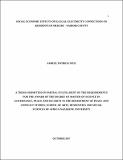Social Economic Effects of Illegal electricity Connections on Residents of Mukuru-Nairobi County

View/
Date
2017Author
Njue, Samuel Patrick
Type
ThesisLanguage
enMetadata
Show full item recordAbstract
This study explored the effects of illegal electricity connections on the residents of Mukuru informal settlement in Nairobi County. There are increased cases of security hazards in the informal settlements worldwide which are attributed to various risks like crimes, population explosions, overcrowding, poverty and diseases. Mukuru is faced with many risks like the other big informal settlements in the world. Mukuru is located on the way-leaves of public utilities namely an oil pipeline, electricity transmission lines, railway line, riparian land, water pipeline and sewage line. The purpose of this study was to investigate the nature of injuries on the people and the impact of damage to their property due to illegal electricity installations. The researcher assessed the social economic effects of illegal electricity connections on the people. The main objective of the study was to explore the adverse effects of illegal electricity connections on the residents of Mukuru. The study specifically assessed the injuries of the residents and destruction of their property which are occasioned by illegal electricity connections. The study also examined the effectiveness of programs of the Government of Kenya in mitigating illegal electricity connections. This research used the differential bill theory as the basis of illegal electricity connections and reviewed literature about illegal electricity connections. The targeted population of the study was 203,863 households in Mukuru. The researcher used a sample size of 255 from the targeted population. The study sample comprised of 240 households’ heads and 15 key informants. Systematic random sampling was used for households’ heads and purposive sampling for key informants. The researcher adopted causal research design. Both quantitative and qualitative data was used. The data was collected using questionnaires and interviews from the respondents. The independent variable was illegal electricity connections and the dependent variable was the injuries on people, deaths of people and destruction of property. The collected data was analyzed through quantitative and qualitative techniques like tables, bar graphs and pie charts and were complemented with the aid of SPSS software 2009. The study obtained a coefficient of multiple determinations (R2 Square) of 0.776 implying that that the regression line is of “High goodness of fit” explaining up to 77.6% of the variation in social economic welfare of the residents in Mukuru. The p-value of 0.000 indicates that the social economic effect of illegal electricity connections is significant at 5% confidence level. According to the findings of this study, the most significant measures that the government has put in place to reduce cases of illegal electricity connections include: legal action against illegal electricity connection offenders; subsidization of installation costs; surveillance of electricity installations; facilitating proper electricity installation and public safety awareness. The study recommends that the government, line agencies and donor communities collaborate with the local communities to put in place adequate structures to survey, design, install, operate, maintain, control and monitor electricity connections in the informal settlements to reduce unpleasant cases of illegal electricity connections. Moreover the study recommends that the government, line agencies, donor agencies invest in public awareness with regards to the possible dangers and risks associated with illegal electricity connections and misuse of electricity installations. Towards this end, public awareness programs should include basic training on emergency response with regards to the outcome of electricity supply faults.
Publisher
Africa Nazarene University
